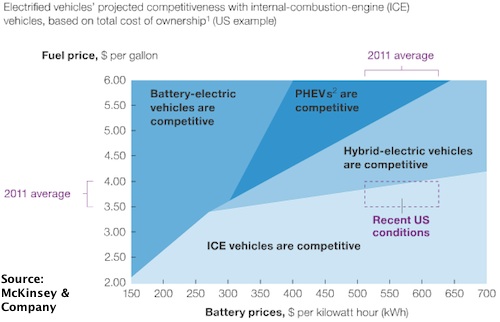
A management consulting company, McKinsey & Company, did this study, published last week, looking at factors that could lead to mainstream adoption. They identified battery pack prices versus gasoline prices as the key dynamic.
The higher gasoline prices go, the easier it is for an electric car to be competitive on total-cost-of-ownership. Likewise the lower battery pack prices go, the easier it is for the electric vehicle to be price competitive.
The study suggests that the price of a complete automotive lithium-ion battery pack could fall from $500 to $600 per kilowatt hour (kWh) today to about $200 per kWh by 2020 and to about $160 per kWh by 2025. In the United States, with gasoline prices at or above $3.50 a gallon, automakers that acquire batteries at prices below $250 per kWh could offer electrified vehicles competitively, on a total-cost-of-ownership basis, with vehicles powered by advanced internal-combustion engines (exhibit).
These figures represent the price per effective kWh, assuming batteries with 70 percent depth of discharge. The price of battery packs includes the price of battery cells, battery-management systems, and packaging. Unless otherwise noted, values here are reported in real dollars, indexed to 2011.
They used a five-year total-cost-of-ownership model that considers the prices of vehicles with advanced internal-combustion engines (in other words, vehicles that satisfy future US government fuel economy standards) and electrified vehicles adapted to make efficient use of on-board energy storage (using 150 watt hours of electricity per kilometer traveled). Note that electrified vehicles offer features, including better acceleration and noise levels, for which customers may be willing to pay more.
Links:-
https://www.mckinseyquarterly.com/Automotive/Strategy_Analysis/Battery_technology_charges_ahead_2997
http://www.torquenews.com/1075/electric-cars-become-inevitable-cost-competitive-2020ish-says-report
http://greentransportation.info/2012-mckinsey-report-says-electric-cars-will-be-cost-competi




This is interesting. But it seems to go against the real world experience of the Prius. It says HEV's have never been competitive (I make that assumption on the fact that gas used to be cheaper (or the same) and that batteries used to be more expensive). However, they've sold well over a million Prius'.
Once again it assumes folks only buy automobiles on TCO or some other metric. Clearly that's not so for the majority of people. Also, folks are notorious for purchasing based on immediate costs not TCO (buy this honkin' great truck for only $99 down!).
Folks buy automobiles on any number of criteria - be they gas guzzlers or hybrids. I'm sure they didn't think about publishing a graph that compares TCO of an I4, a V6 and a V8? Just so the V8 guys can know how much extra they've spent for that extra horsepower they'll hardly ever (or never?) use.
I like the graph but it just seems a little pointless at predicting much of anything.
John H. Founder of Current Motor Company - opinions on this site belong to me; not to my employer
Remember: " 'lectric for local. diesel for distance" - JTH, Amp Bros || "No Gas.